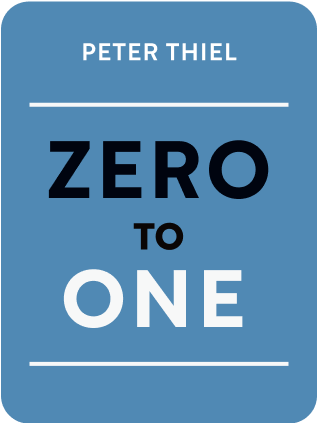

This article is an excerpt from the Shortform summary of "Zero To One" by Peter Thiel. Shortform has the world's best summaries of books you should be reading.
Like this article? Sign up for a free trial here .
How do you go from “zero to one”? How do you successfully get your startup on the road to success?
According to Peter Thiel, the author of Zero to One, there are seven things you need to achieve startup success: 1) revolutionary technology, 2) unique insight, 3) monopoly status, 4) strategic timing, 5) a great team, 6) effective distribution, and 7) enduring value. He uses the clean tech crash and the rise of Tesla as case studies to illustrate his checklist.
Read more to learn these seven principles for startup success.
From Zero to One
Thiel puts his principles together into a checklist for success. He then elaborates on this checklist by discussing the clean-tech bubble of the early 2000s.
To position yourself for a successful startup—to go from zero to one—Thiel says you need seven things:
- Revolutionary technology. Thiel cautions that making an incremental improvement to an existing technology is generally not a great opportunity. Instead, you need a breakthrough that provides fundamentally new capabilities, or, at the very least, increases existing capabilities by a factor of 10.
- Unique insight. Thiel advises that if other people have already developed the same technology or identified the same opportunity, then it’s probably not worth pursuing, because competition will consume your profits.
- Monopoly status. Thiel reiterates that successful companies don’t compete, they monopolize.
- Strategic timing. Even if you’re the first to invent a revolutionary technology, Thiel asks you to consider whether it’s the right time to produce and market it. In addition to being revolutionary, is your technology mature enough to deploy effectively? And is the market ready to receive it?
- A great team. Can you assemble a team of people who share a zeal for your startup’s unique vision and collectively possess the skills necessary to achieve it?
- Effective distribution. Thiel reiterates that your strategy for selling your product is as important as your technical development work.
- Enduring value. Remember, your goal is to build a monopoly that will generate long-term profits by introducing a revolutionary product that no one else can match.
Case Study: The Clean Tech Bubble
First, Thiel shows how most clean tech companies of the early 2000s scored poorly on his checklist for success, ultimately leading to the collapse of the bubble.
- Revolutionary technology. Most clean tech companies only developed incremental improvements on existing technology, such as solar panels and wind turbines. A company called Solyndra came up with cylindrical solar cells that were unique, but they were actually less efficient than conventional flat ones. So the revolutionary technology just wasn’t there.
- Unique insight. In the early 2000s, it was common knowledge that the world needed environmentally friendly energy sources. Thiel comments that it became fashionable for people to be “social entrepreneurs,” trying to build profitable companies around social issues like protecting the environment. But he says this was part of the problem, because if you build your company around an idea that everyone already agrees is good, then that idea is clearly not a unique insight.
- Monopoly status. The global energy market is enormous—worth trillions of dollars. As such, it was far too big for a startup company to dominate, and there were hundreds of startups with similar clean energy products competing for market share.
- Strategic timing. Despite the surge of interest in clean energy technologies in the early 2000s, technological advancement in that area continued to advance incrementally, as it had since the 1950s. There were no real breakthroughs that would have provided a strategic opportunity to meet the burgeoning demand, so the timing wasn’t all that favorable.
- A great team. According to Thiel, most of the clean energy startups that failed during the bubble collapse were founded by people with little or no technical expertise, which contributed to their inability to develop revolutionary technology.
- Effective distribution. This was another failure point for many clean-tech companies. Thiel discusses the example of Better Place, a company that developed an electric vehicle with interchangeable batteries. To refuel the car, you could just swap out the batteries. Thiel says their system worked well, in a technical sense, but the company went out of business because they didn’t make it easy enough for people to buy their cars.
- Enduring value. According to Thiel, most clean tech companies made poor predictions about the future: They failed to consider the fact that China would enter the solar panel market and undercut their prices. They failed to predict that new “fracking” technology would expedite the production of oil and bring fuel prices down. These effects both contributed to making their long-term strategy untenable.
A Clean Tech Success: Tesla
Thiel presents Tesla as an example of one of the few clean tech companies that succeeded because it met his checklist for success:
- Revolutionary technology. In Thiel’s opinion, Tesla’s 2013 model S sedan represented a technological breakthrough at the systems-engineering level: Most of its components were arguably conventional, but the way they were integrated together created a product with unique capabilities.
- Unique insight. Thiel observes that Tesla had a unique insight into the reason people bought electric cars: An electric car was a status symbol that showed off the owner’s commitment to protecting the environment, and this social movement was strongest among the social elites. So Tesla developed an electric luxury sports car that was vastly more appealing to wealthy elites than the utilitarian electric cars other companies were producing.
- Monopoly status. Because the market for luxury electric sports cars was so exclusive, Tesla was able to dominate it quickly.
- Strategic timing. Tesla started up right at the end of the clean tech bubble, taking advantage of government subsidy funding while it was still available.
- A great team. The Tesla team was competent both in engineering and sales.
- Effective distribution. Tesla went with a direct-sales model. Thiel notes that building its own dealerships instead of selling wholesale to established dealers cost Tesla a lot of money up front, but saved money in the long run. It also gave them full control over the buying experience, enabling them to build a stronger brand by emphasizing customer satisfaction.
- Enduring value. As the first company to dominate the market for electric luxury cars, Thiel believes Tesla is positioned to remain the market leader for the foreseeable future.

———End of Preview———
Like what you just read? Read the rest of the world's best summary of Peter Thiel's "Zero To One" at Shortform .
Here's what you'll find in our full Zero To One summary :
- Why some companies genuinely move the world forward when most don't
- How to build a company that becomes a monopoly (and why monopolies aren't bad)
- Silicon Valley secrets to selling products and building rockstar teams






